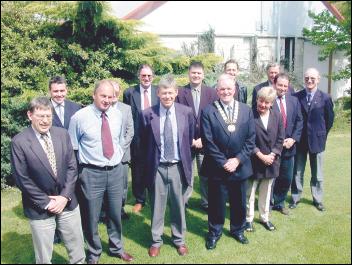
The new Central Otago District Council
Back row (from left): Colin Stevenson, Kit O'Malley (slightly obscured), Terry Emmitt, Neil Gillespie, Martin McPherson, Mike Dowling, Gordon Stewart. Front row: John Lane, Graham Dillon, Tony Lepper, Mayor Malcolm Macpherson, Lynley Claridge, Stu Millis. Graeme Smith was absent
By Steve Hepburn, Otago Daily Times
Alexandra
Economic development is to be given heavy emphasis by the new Central Otago District Council.
New Mayor Malcolm Macpherson, who was sworn in with the new council yesterday, was fully supported in his decision to give full council committee status to the council's economic development committee.
"We're effectively moving it from the back office to the shop window," Dr Macpherson said.
"That change is more than symbolic. Economic development becomes one of the big three - the committees of the whole, with all councillors as members, part of the agenda of the six-weekly full council meetings."
Previously, the economic development committee had been chaired by Cr Graham Dillon with five other councillors and representatives of Central Otago businesses. Cr Dillon would continue as chairman of the committee.
Dr Macpherson said surveys had shown ratepayers thought economic development was important to the district. "The 2001 opinion survey showed us 99% of people think economic development is important to the district and 97% think that the promotion and growth of tourism is important. Economic development will be a core function of the new council."
Deputy mayor Tony Lepper was appointed chairman of the operations committee and the roading hierarchy subcommittee. John Lane has been appointed chairman of the planning and regulatory committee, the hearings panel and Tourism Central Otago. The former chairwoman, Edna McAtamney, who failed in her mayoral bid, was appointed to the Tourism Central Otago committee, along with a representative from the Department of Conservation. Mrs McAtamney is no longer on the council.
The first decision made by the new council was to not give its members a pay rise. The old council had left the decision on increased remuneration lying on the table. The new council was offered an average pay rise of about 2.6%, with the mayor reaching a maximum of $47,760 per annum before allowances. Corporate services manager Heather Kinsey said that, even if they accepted the pay rise, councillors did not have to take up the increase.
New councillor Colin Stevenson said the council should be leading by example and not taking the pay rise. "We should be holding costs and I believe people who are sitting round the council are not doing it for the financial gain." The decision to not accept the pay rise was supported unanimously by council. The mayor will be paid $46,590 per annum, while an ordinary councillor will be paid $6790 before allowances.
Water deputy mayor's priority - page 10
Thursday, 1 November 2001
Copyright
If printing and distributing
please leave all logos and site branding intact
If printing and distributing
please leave all logos and site branding intact